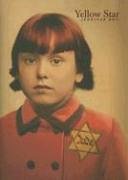
Yellow Star
Written by Jennifer Roy
Marshall Cavendish, 2006, 227 pp.
ISBN: 978-0761452775
Using free verse poetry, Jennifer Roy presents a remarkable story of childhood innocence, courage, and hope during the Holocaust. With a season by season timeline of World War II events and the Nazi Regime, this gripping retelling of Jewish survival is unforgettable.
Sylvia Perlmutter, Roy’s aunt, is one of the twelve child survivors who emerge from the Lodz, Poland ghetto. Beginning each section with a brief synopsis of the new year’s occurrences, Roy does an excellent job of revealing what is to come while simultaneously drawing the reader into Sylvia’s story. Sylvia is only four years old when German Nazis invades Poland, sending her family on a journey to Warsaw in search of refuge. Unsuccessful, Sylvia’s family returns to Lodz. In February of 1940 the Perlmutter family is relocated from their apartment into the ghetto. With six years of worries ranging from getting shot with no reasonable explanation, being called to board a train headed towards “a better arrangement,” starvation, freezing to death, and being buried alive, Sylvia’s life is a true testament of courage.
As the war progresses so does the diminishing number of ghetto inhabitants. Isaac Perlmutter, Sylvia’s father, is a quick witted man with acute observation skills. He outmaneuvers the Nazi guards and is the saving grace for several families. On January 19, 1945 Sylvia awakens her family because of bombing and they flee to the ghetto courtyard where they are met by others in hiding. As the smoke disperses, Russian soldiers on horseback ride in to greet the crowd. Due to the stars of David patched on their clothing, the Jewish Russian major who was ordered to demolish the entire camp abandons those orders to rescue the lone survivors. The Perlmutter family along with Isaac’s brother, his wife, and their son were seven of approximately 800 Jewish survivors liberated from the Lodz ghetto.
As the niece of the narrator within the story, Jennifer Roy has the connection of being a Jew and the personal insights of Sylvia. The authenticity of this novel is supported with a timeline of events between 1939-1945– before, during, and after World War II. Yellow Star and Daniel Half Human: and the Good Nazi by David Chotjewitz (2004) note the same occurrences for each year. Daniel Half Human would be an excellent novel to pair with Yellow Star in a Holocaust study. Chotjewitz offers duel perspectives through a German Nazi soldier and his best friend who is half Jewish. Although many individuals revel in the retribution that Jews received after liberation when most of National Socialist (Nazi) Party were imprisoned, killed, or committed suicide, Chotjewitz made me debate whether to blame the German soldier in Daniel Half Human for treating his friend in that manner in order to save his life. How does one define selfishness and compassion? These two novels offer different outlooks on the Holocaust, one based on surviving as a Jew and the other surviving as a German.
Tyler Cordes, Oklahoma State University, Stillwater, OK
WOW Review, Volume IV, Issue 1 by Worlds of Words is licensed under a Creative Commons Attribution-NonCommercial-ShareAlike 4.0 International License. Based on work at https://wowlit.org/on-line-publications/review/iv-1/

Hello,
How I wish I had found this posting before I submitted my changes for the paperback version of Karma! As you can imagine it is not easy to write of Indian culture as a foreigner. All assurances to readers that I did enlist the help of three Indo-Canadian writers for assistance with the language (one writer of HIndu descent and two Sikh-Punjabi writers). Not only did they read for accuracy but also made many of the additions that you refer to as incorrect. Sigh. It is so difficult to get things right. Writing Karma was a very risky undertaking that I spent three years on. To explore both a culture and the dire political situation of 1984 as an outsider was fraught with peril but I was committed to telling this important story. My hope was to bring to light the relatively unknown massacre of the Sikhs to the general community as well as write about the difficulties of immigration, identity and adolescence. It was a work of passion that I am proud of. Many thanks for taking the time to read Karma and offer your thoughts. I learned much for your post. All my best, Cathy Ostlere
Hello Cathy,
Thank you for your gracious response! I thoroughly enjoyed reading the novel and was stunned at the meticulous descriptions of daily life in India, especially considering that your first visit to India was not exactly very pleasurable. India is complex and it is very challenging to view it as a single entity or a single theoretical construct. I admire and applaud your resolve to write a novel about my homeland despite the challenges of being an outsider. And I also applaud your thematic choice for the main plot – the riots following Mrs. Gandhi’s assassination are some of the least known and least discussed topics of Indian politics. I hope you will be writing another such powerful story set in India pretty soon! Warmest regards, Shri Ramakrishnan